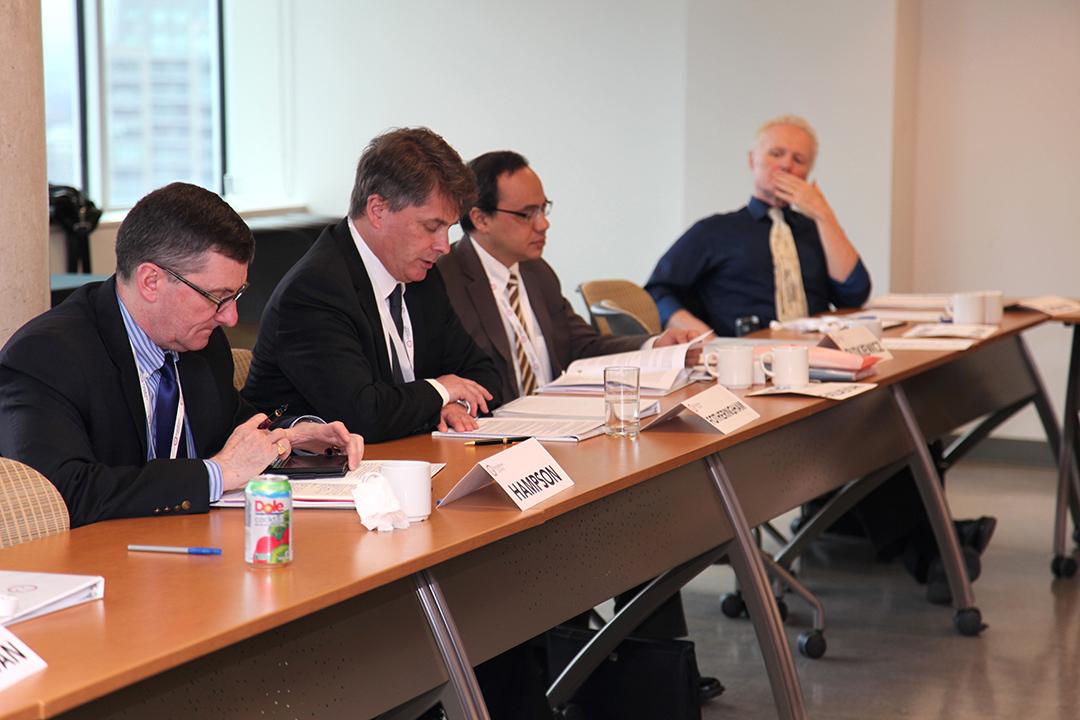
On April 20, 2015, the Right Honourable Jean Chrétien chaired a High-Level Expert Group (HLEG) meeting on Russia-Ukraine at the University of Ottawa. This gathering was a preparatory meeting for the InterAction Council's (IAC) 32nd Annual Plenary Meeting to be held in Wales, the United Kingdom, from June 2 to 5, 2015. The outcome of this meeting is a Chairman's Report entitled, "Firmness and Dialogue: How Best to Respond to Russia?s Challenges in Ukraine, Europe, and the West," which can be accessed HERE, to be tabled at the plenary in June.
Understanding the origins of recent Russian policy towards Ukraine, Europe, and the West as a whole has proved difficult, as the narratives inside Russia are totally at odds with the perceptions outside Russia. In that spirit, a group of people from different political and national backgrounds - including the ambassadors to Canada from Russia, Ukraine, Germany, Indonesia, and Norway - met on April 20th in Ottawa to discuss the conflict in Ukraine and suggest ways of achieving a peaceful solution to the crisis.
"What is happening in Ukraine presents a series of challenges that the global community must work together to try and resolve," said Jean Chrétien, Co-chair of the InterAction Council. "One area that we explored at the Ottawa meeting - and that I think as Canadians we understand well, is that it is possible to have a central government and regional autonomy, with language and religion guarantees, that work well. I believe this might be one way to help resolve the dispute in Ukraine."
The report contains eight recommendations, including, providing financial support to rebuild Ukraine?s economy, continued engagement with Russia on areas of mutual interest such as the Arctic and continuing the pathway for peace by transforming the Minsk II accord into a lasting peace agreement before it expires later this year.
On April 29th, at the 3rd Global Baku Forum in Azerbaijan, several members of the InterAction Council attended a panel discussion featuring former Ukrainian presidents Leonid Kravchuk, Leonid Kuchma, and Viktor Yushchenko. Jean Chrétien had the opportunity to meet with these three leaders individually and to invite a Ukrainian delegation to attend the June plenary meeting. The three former presidents, who are involved with the drafting of the new Constitution for Ukraine, invited Mr. Chrétien to visit and share his experience with the constitutional commission in the fall.
The following day, on April 30th, Jean Chrétien met the President Vladimir Putin in a private meeting at Novo-Ogaryovo residence outside Moscow. They had a wide-ranging discussion centred on some of the topics contained in the report. Mr. Chrétien frankly expressed the concerns in the West regarding the conflict in Eastern Ukraine.
Mr. Chrétien also raised the case of the Ukrainian pilot Nadia Savchenko who is being held in Moscow.
Mr. Chrétien further asked President Putin to appoint a representative to attend the IAC's June plenary in Wales.
The two-day Annual Plenary Meeting will bring together over 20 former heads of state and government, including Former Ukrainian President Viktor Yushchenko and former Russian Prime Minister Viktor Zubkov. Also attending will be leading academics and policy makers to deliberate on three topics: Russia-Ukraine, responding to global health emergencies, and the economy.
In its 32-year history, the InterAction Council has been at the forefront of many prominent issues, most notably the 1997 drafting of the Universal Declaration of Human Responsibilities, a document proposed to counterbalance the United Nation's Universal Declaration of Human Rights; the 2010 Hiroshima Declaration, a powerful plea for the abolishment of nuclear weapons; and the 2012 report, The Global Water Crisis: Addressing an Urgent Security Issue.
About InterAction Council
Established in 1983, the InterAction Council of Former Heads of State and Government is an international organization whose objective is to address long-term, global issues facing humankind. Co-Chaired by the Right Honourable Jean Chrétien (Prime Minister of Canada, 1993-2003) and Dr. Franz Vranitzky (Chancellor of Austria, 1986-1997), the Council's membership is comprised of 35 former heads of state who volunteer their time to develop proposals for action and submit them directly to national and international decision-makers.
- 30 -
For further information, please visit the InterAction Council website at www.interactioncouncil.org or contact:
Tanya Guy - tanya.guy(@)interactioncouncil.org

